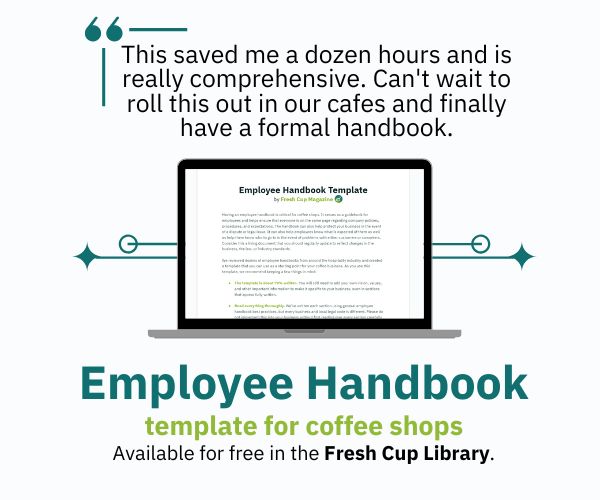Yemeni coffee exporters are bringing Yemeni coffee home. Plus, all the ways the new EU anti-deforestation legislation will impact the coffee industry and meet the anti-union advocacy group driving the (so-far-unsuccessful) Starbucks union decertification campaign.
‘Yemen Speciality Coffee ‘Wave’ Sweeps War-hit Capital’ – via France 24
A specialty coffee scene is brewing in Yemen amid an ongoing civil war.
Yemen has played a vital role in the history of coffee. Records indicate that coffee cultivation happened in the country as early as the 12th century, and Sufi saints in the 15th century are said to be the first to brew coffee.
Today, Yemen-grown coffee is highly prized due to its quality and scarcity. But export difficulties have inspired some to turn their attentions closer to home, creating a market for specialty coffee within Yemen that France 24 describes as “bring[ing] flashes of Brooklyn and Paris to Sanaa’s war-scarred streets.”
“People started to feel like Yemeni coffee was costing a lot and they lost interest in buying it,” says Rashed Ahmed Shagea of Durar Coffee. Shagea opened a coffee shop in Sanaa in 2015 in response to dwindling interest in exported Yemeni coffee—instead, his coffee shop serves beans grown in the country. “We had to think of another way to support our farmers.”
Other exporters share similar stories of having to switch their focus as the fighting intensified. A truce signed in 2022 has eased things somewhat—and while many of the exporters interviewed for the piece have diversified by opening coffee shops and encouraging in-country consumption, many still rely on exporting beans to support their businesses.
However, many hope to continue encouraging local consumption in the coming years. “This place will grow in the future to become the largest coffee center in the Middle East,” one coffee shop manager predicted. “We have a goal, which is a journey back to the glory, culture and authenticity of Yemeni coffee.”
‘Eight Ways the EUDR is Likely to Affect Coffee Supply Markets’ – via Daily Coffee News
Stakeholders worldwide are beginning to lay out plans as the European Union’s new law banning the import of products linked to deforestation inches closer to implementation. To comply with the legislation, importing companies must prove that their supply chains do not contribute to the destruction or clearance of forests—something that is relatively straightforward to do with large farms but much harder when hundreds of smallholders are involved.
Coffee production causes an estimated 100,000 hectares of deforestation each year, and the small size of the average coffee farm means that for many, the new law will be extra complicated to implement. The article notes that more than 6 million smallholder coffee farms will need to have their boundaries mapped, and this data must align with historical maps to show that no deforestation has occurred before their crops can be sold to the EU.
Because of the difficulty and complexity of all this data collection and management, some fear that this will lead companies to pass the costs down to smallholder farmers or bypass them altogether. Being shut out of the largest coffee market in the world—the EU accounts for almost one-third of global consumption—could be highly harmful to the millions of smallholder farmers who make up the majority of coffee producers.
The authors of this piece discuss eight different effects of the deforestation regulation (EUDR), which they note will “likely favor larger farm sizes and better-organized smallholder production origins above those with small farm sizes and low access to verification and data services.”
Let’s take a look at some of the article’s insights:
- Brazil will likely benefit from the new law due to its “good land title data, polygon data and forest monitoring data, with much of it already digitized.”
- Robusta-dependent countries such as Vietnam and Uganda are already planning ahead due to their reliance on export trade to Europe.
- Countries at risk include Ethiopia, which has an “already opaque coffee market.” Additionally, the bulk of Ethiopian coffee comes from loosely defined forest or garden coffee systems, where farmers harvest wild coffee or from small plots planted around their homes. The article authors mention they are uncertain how such systems “will fare under satellite monitoring that struggles to distinguish between agroforestry trees replaced and forest trees cleared.”
- Big companies like Nestlé that have already invested in traceability and mapping will have a head start on compliance.
- Coordination will be key: the authors suggest that companies should share data and systems to maximize efficiency and lower the cost of compliance, while governments should set clear rules for data sharing and compatibility. Otherwise, “there will be a high risk of fraudulent data being provided to companies, since the pressure to comply will lead to corners being cut.”
As the authors conclude, “The stakes are particularly high for millions of smallholders dependent on coffee as their main source of income.”
More News
‘Brazil Coffee Harvest Below Normal Pace at 74% of Area, Report Finds‘ – via Nasdaq
‘Cafe Imports Among Buyers at 2nd Venezuelan Coffee Competition EICEV‘ – via Daily Coffee News
‘Onyx Coffee Lab To Open A Chocolate-Focused Cafe In Springdale, AR’ – via Sprudge
‘RTD Cold Brew Maker High Brew Acquired by Beliv’ – via Daily Coffee News
‘Coffee Day Global Now in Bankruptcy Process’ – via the Economic Times
‘Study Explores Costs and Profitability in ‘Specialty Coffee’ Production‘ – via Daily Coffee News
‘Britvic Announces Acquisition of Jimmy’s Iced Coffee‘ – via FoodBev
‘Culttivo Raises $14.5 Million to Extend Credit to Brazil’s Small-scale Coffee Producers’ – via Impact Alpha
‘JDE Peet’s Acquiring Brazilian Coffee Business Maratá‘ – via Daily Coffee News
‘Plans for New Café at Former Little Dog No Longer Brewing in Brunswick’ – via the Portland Press Herald
The Week in Coffee Unionizing
Since the first Starbucks voted to unionize in 2021, over 300 other stores have voted to unionize—but so far, not a single store has ratified a contract. Both sides blame the other: the union accuses the company of stalling, while Starbucks says the union refuses to meet in person.
Timing is everything when it comes to negotiating a union contract. The union is protected for a year after winning an initial victory—however, if a year has passed after a unionization vote with no agreement in place, workers can petition to decertify the union. Decertification campaigns are beginning, albeit in tiny numbers, supported by a prominent anti-labor advocacy group and promoted by the US Chamber of Commerce and the company itself.
The latest attempt is in Philadelphia, where a single worker, backed by the National Right to Work Legal Defense Foundation (NRTWLDF), is trying to decertify their shop’s union. The NRTWLDF is a non-profit organization linked to and funded by various right-wing billionaires and foundations that works “to eliminate coercive union power and compulsory unionism abuses through strategic litigation, public information, and education programs.”
In another recent case, the National Labor Relations Board’s regional director dismissed a decertification petition filed at the Reserve Roastery in Manhattan due to the “litany of unfair labor practices” filed by the store’s workers against the company. The NLRB’s regional director has already thrown out two similar efforts in New York state, saying that Starbucks’ actions and pending allegations “irrevocably taint the petition and any related election.” All three petitions were supported pro bono by the NRTWLDF.
In an analysis of the decertification effort, Bloomberg Law interviewed several experts who point to the sheer number of charges and rulings against Starbucks as evidence that the NLRB will probably dismiss other decertification petitions. The union can file “blocking charges,” arguing that the number of labor violations and complaints against Starbucks means any decertification election would be unfair. “This is not a case where the union’s just throwing up some potentially weak charges just as a defensive measure,” said labor law professor Jeffrey Hirsch. “The region (the NLRB regional office), not the union, seems to think there’s actually something there.”
Meanwhile, workers at three Peet’s Coffee locations in California have voted to unionize. Two unanimous decisions at stores in Berkeley and a close 8-7 vote in Oakland means there are now four unionized Peet’s stores after a location in Davis voted to unionize in January 2023. The union drive, inspired by the Starbucks Workers United movement, began as a way for workers to demand better wages and benefits as well as protection from harassment by customers. Peet’s said it respects the outcome of the vote and “look[s] forward to writing the next chapter together with our employees.”
Is Coffee Good For You?
Drinking coffee could help lower your risk of developing irritable bowel syndrome.
General advice for current IBS sufferers is to avoid coffee and caffeine as they can exacerbate symptoms, and one previous study found that coffee intake is associated with a greater risk of developing IBS. This new research published in the International Journal of Epidemiology set out to explore the same question and came to the opposite conclusion. Science!
Researchers from the University of Oxford used the UK Biobank biomedical database to examine over 400,000 participants who were free of IBS, coeliac disease, inflammatory bowel disease, and cancer at the beginning of the study. Participants filled out a questionnaire about their coffee and tea intake and then tracked for about 12 years. Those who consumed four or more cups of “instant or ground coffee” daily were 19% less likely to develop IBS than those who abstained completely.
Interestingly, for tea fans, moderate drinkers (those who had half a cup to one cup per day) had the lowest risk of developing IBS, with no association found for those who drank more.
Beyond the Headlines
‘”Some Serious Gourmet Shit”: Coffee In The Films Of Quentin Tarantino’ by Jackson O’Brien
‘Willful Ignorance as a Union-Busting Tactic’ by Ashley Rodriguez















